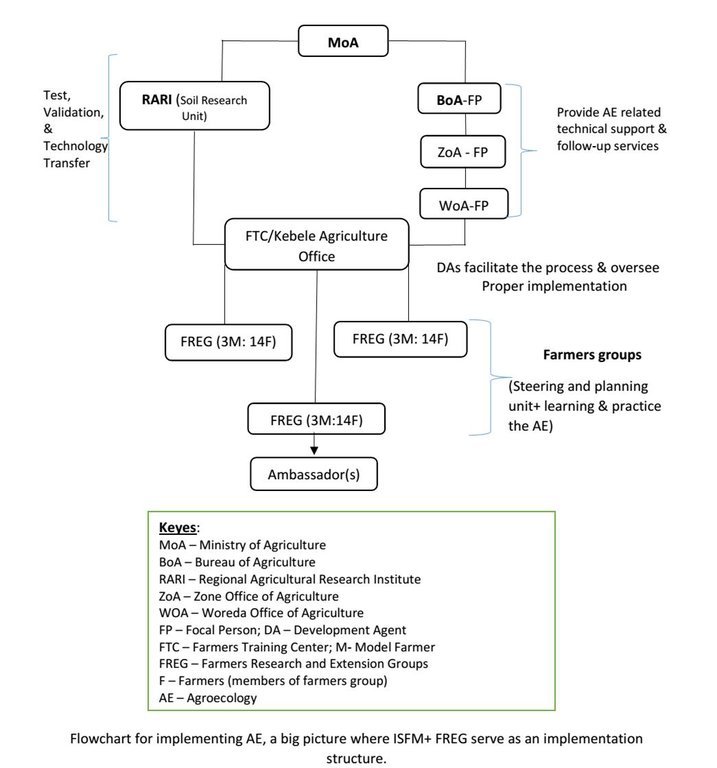



Farmers Research and Extension Groups (FREGs) are the approach used to test and spread Integrated Soil and Fertility Management (ISFM+)/Agroecology project best practices in Ethiopia. These technologies include livestock urine collection and use, cover crops, intercropping, vermicompost, acid soil treatment by liming, green manures, crop residue management, and bioslurry. A FREG employs a participatory approach, whereby joint investigation and learning is implemented. Farmers' group members use participatory planning and peer learning from one another. The approach is gender inclusive: one-third of the members in a FREG are women. There is also a mix of social categories. FREGs are populated by proactive model farmers who adopt and demonstrate technologies for scaling up. After the first year, the best-performing model farmer serves as an ambassador for knowledge and skills transfer to the indirect beneficiaries.
Collective investigation, learning, adoption, and then promotion of proven technologies are the key features of the approach. Member of the FREG jointly identify soil fertility/acidity-related issues, participate in training and demonstrate the technologies. The ISFM+/ Agroecology projects equip the target groups with implementation skills and knowledge. Site and participant selection are made with participation of woreda and kebele representative partners and the target farmers. Then soil-related issues are jointly identified with the support of laboratory analysis by the Regional Research Institute. This demonstrates that the intervention is implemented by the public research and development actors with technical, financial and/or inputs supply from the projects. The approach tends to mobilize the communities living in similar agroecology and farming systems who are subjected to the same SLM-related issues.
Identifying proactive model farmers and establishing demonstration plots for different technologies and crop types are the basis of collective learning. The demonstration is employed as an experimental and learning plot by showcasing and inspiring farmer groups and indirect beneficiaries in the area. Organizing field days and exchange visits further enables the demonstration of technologies for scaling out. Experience shows that where ISFM+ technologies have been piloted, farmers have built up new agroecology technologies such as cover cropping, intercropping and woodlots development over and above those previously adopted. Target farmers have piloted at least three or more technologies/practices on their plots. The woreda office of agriculture through the assigned project focal person gives closer follow-up for the proper implementation of the technologies. Provision of technical support and advisory service via the development agents (DAs) are among many other services.

Байршил: Sodo Zuria district, Kuto-Sarfela kebele, Southern Nations, Nationalities and People Region (SNNPR), Этиоп
Эхлэх огноо: 2022
Төгсөх жил: тодорхойгүй
Арга барилын төрөл
| Ямар оролцогч талууд / хэрэгжүүлэгч байгууллагууд арга барилд оролцож байсан бэ? | Оролцогч талуудыг тодорхойлно уу | Оролцогч талуудын үүргийг тайлбарлана уу |
| Орон нутгийн газар ашиглагч / орон нутгийн иргэд | Members of farmers group | Participate in participatory planning, implementation, and evaluation of the intervention. |
| ГТМ-ийн мэргэжилтэн/ хөдөө аж ахуйн зөвлөх | Woreda Natural Resource Management experts or project focal person and development agents. | Facilitate farmers' group meetings during participatory planning, implementation, and participatory evaluation of the activities. Also, provide technical support to the implementers at the various stages of project implementation. |
| Орон нутгийн захиргаа | Kebele administration | Assist in technology scaling up/out via mobilizing the community to learn and adopt from the pilot activities. |
| Засгийн газар (шийдвэр гаргагч, төлөвлөгч) | Ministry of Agriculture | Establish an agreement with the project and support it in steering the institutionalization of proven technologies for scaling out via policy support. |
| Олон улсын байгууллага | GIZ | Provide financial, technical and material support to the partner organizations and the end users of the project intervention via the public line offices. |
Agroecology/ISFM+ implementation flow chart that ran from the Ministry of Agriculture to the local level institution, the FREG. The role of stakeholders at different levels are briefly described in the flow chart.

Шийдвэр гаргасан этгээд
Шийдвэр гаргах үндэслэл нь
The concepts of agroecology, integrated soil fertility management and overall benefits of cover cropping and related crops such as Desmodium.
Research is part of the introduced technologies. Problem identification is the entryway to introducing a new technology/practice. Regional Agricultural Research Institute involves in the assessment and identification of problems, evaluation, and issuance of appropriate recommendations that make the intervention evidence-based.
For best-performing farmers, incentives such as solar panels, energy-saving cooking stoves, wheelbarrows, etc., are offered to further motivate the farmers and enable them to properly implement the technology and become a very good advocator for scaling the beneficial practices.
Land users are decision makers on selection of technologies.
Through piloting and learning from the technologies.
The positive outcome of applying the FREG is considered as a payoff for participating farmers as it gave them the energy to sustain the adopted practices. The outputs of integrating technologies, collective learning, and action allow to see significant yield increment per unit of land, improved soil fertility and soil health, etc.